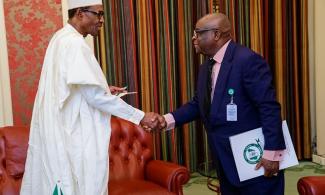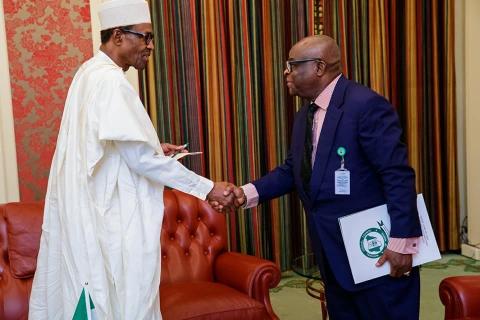
The group said for taking the action outside the provisions of the Constitution, "the President should be impeached".

The Human Rights Writers Association of Nigeria (HURIWA) says the suspension of Walter Onnoghen as the Chief Justice of Nigeria (CJN), and swearing in of another judge as acting CJN, "without due process amounts to high treason".
The group also said for taking the action outside the provisions of the Constitution, "the President should be impeached".
President Muhammadu Buhari had suspended Onnoghen and swore in Ibrahim Tanko Mohammed as the acting CJN on Friday. [story_link align="left"]66516[/story_link]
In his remarks on Onnoghen's suspension, the President had premised his decision on "an Order of the Code of Conduct Tribunal issued on Wednesday 23rd January 2019, directing the suspension of the Chief Justice of Nigeria, Honourable Justice Walter Nkanu Samuel Onnoghen from office pending final determination of the cases against him at the Code of Conduct Tribunal and several other fora relating to his alleged breach of the Code of Conduct for Public Officers". [story_link align="left"]66519[/story_link]
However, a statement by Comrade Emmanuel Onwubiko and Miss Zainab Yusuf, the National Coordinator and National Media Affairs Director of HURIWA, respectively, quoted Section 292 of the Nigerian Constitution which does not expressly distinguishe between “temporary removal (suspension) from a permanent removal (sack)”.
According to the provisions of the 1999 Constitution, the CJN can only be removed with the knowledge of the National Assembly — the removal must be approved by two-thirds majority of the National Assembly.
Portraying HURIWA’s contrary position to the President’s decision to suspend the CJN, the statement read: “The power to remove is different and is even more stringently interpreted in employments with statutory flavor as in this case, but we have not even begun to talk about the power of removal. Granted that the CCT may have a constitutional role in the removal of the CJN going by a wholistic reading of the above provisions, but there is no statutory provision that clothes the CCT with power to order the CJN or any person appearing before it to step aside or recommend that the President should suspend the CJN or anyone appearing before it.
“Such a procedure amounts to denying the CJN or whoever has been subjected to such treatment by the CCT, his constitutionally guaranteed presumption of innocence and is an imposition of punishment by the CCT even before it has made a finding of guilt (which finding is even appealable to the Court of Appeal). Even after finding a person such as the CJN guilty of a contravention against the Code of Conduct the Constitution strictly lists the punishments it can impose on the guilty party (subject to his right of appeal) and the listed punishments do not include suspension or recommendation for suspension. It is putting the cart before the horse, and a violation of the rights of the accused to a fair trial, to suspend him from office while he is undergoing trial before your court when you are not his employer who has initiated disciplinary proceedings against him.
“The suspension of the CJN by the president under whatever guise constitutes a constitutional infringement of the principle of separation of powers and a usurpation of the disciplinary powers of the NJC enshrined in the Constitution. The power of removal granted under the constitution not being an absolute power but one predicated on specified conditions and requiring the participation of other actors alongside the President, does not include the power to unilaterally suspend which is under of the disciplinary powers of the NJC.
“As we have always maintained the decision in the Nganjiwa case, in blurring the delicate lines between disciplinary and penal proceedings may have unwittingly contributed to the desperation that led to this monumental blunder in suggesting to the minds of those ignorant of the workings of the law, that the judiciary was hell-bent on protecting its corrupt members and shielding them from the reach of the law. While the current blunder is inexcusable, we can feel the reverberating effect of the Nganjiwa case in the spate of court orders and applications that has trailed this particular case and finally culminated in this desperate measure whether well motivated or ill motivated. In the final analysis, this ill-advised move has rendered nugatory whatever credibility there seemed to be in the initial revelation of undeclared asset by the CJN and transformed the case into one of ill-advised abuse of power. Two wrongs do not make a right.”